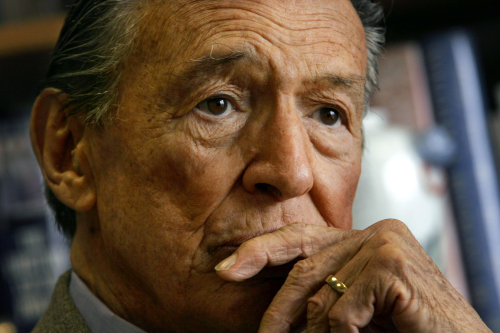NEW YORK (AP) ― CBS newsman Mike Wallace, the dogged, merciless reporter and interviewer who took on politicians, celebrities and other public figures in a 60-year career highlighted by the on-air confrontations that helped make “60 Minutes’’ the most successful primetime television news program ever, has died. He was 93.
Wallace died Saturday night, CBS spokesman Kevin Tedesco said. On CBS’ “Face the Nation,’’ host Bob Schieffer said Wallace died at a care facility in New Canaan, Connecticut, where he had lived in recent years.
Until he was slowed by heart surgery as he neared his 90th birthday in 2008, Wallace continued making news, doing “60 Minutes’’ interviews with such subjects as Jack Kevorkian and Roger Clemens. He had promised to still do occasional reports when he announced his retirement as a regular correspondent in March 2006.
 |
This May 8, 2006 file photo shows Mike Wallace, longtime CBS “60 Minutes” correspondent, during an interview at his office in New York. (AP-Yonhap News) |
Wallace said then that he had long vowed to retire “when my toes turn up’’ and “they’re just beginning to curl a trifle. ... It’s become apparent to me that my eyes and ears, among other appurtenances, aren’t quite what they used to be.’’
Among his later contributions, after bowing out as a regular on “60 Minutes,’’ was a May 2007 profile of Republican presidential hopeful Mitt Romney, and an interview with Kevorkian, the assisted suicide doctor released from prison in June 2007 who died June 3, 2011, at age 83.
In December 2007, Wallace landed the first interview with Clemens after the star pitcher was implicated in the report by former Sen. George Mitchell on performance enhancing drugs in baseball. The interview, in which Clemens maintained his innocence, was broadcast in early January 2008.
Wallace’s “extraordinary contribution as a broadcaster is immeasurable and he has been a force within the television industry throughout its existence,’’ Leslie Moonves, CBS Corp. president and CEO, said in a statement Sunday.
Wallace was the first man hired when late CBS news producer Don Hewitt put together the staff of “60 Minutes’’ at the TV news magazine’s inception in 1968. The show wasn’t a hit at first, but it worked its way up to the top 10 in the 1977-78 season and remained there, season after season, with Wallace as one of its mainstays. Among other things, it proved there could be big profits in TV journalism.
The top 10 streak was broken in 2001, in part due to the onset of huge-drawing rated reality shows. But “60 Minutes’’ remained in the top 25 in recent years, ranking 15th in viewers in the 2010-11 season.
The show pioneered the use of “ambush interviews,’’ with reporter and camera crew corralling alleged wrongdoers in parking lots, hallways, wherever a comment ― or at least a stricken expression ― might be harvested from someone dodging the reporters’ phone calls.
Such tactics were phased out over time ― Wallace said they provided drama but not much good information.
And his style never was all about surprise, anyway. Wallace was a master of the skeptical follow-up question, coaxing his prey with a “forgive me, but ...’’ or a simple, “come on.’’ He was known as one who did his homework, spending hours preparing for interviews, and alongside the exposes, “60 Minutes’’ featured insightful talks with celebrities and world leaders.
He was equally tough on public and private behavior. In 1973, with the Watergate scandal growing, he sat with top Nixon aide John Ehrlichman and read a long list of alleged crimes, from money laundering to obstructing justice. “All of this, Wallace noted, “by the law and order administration of Richard Nixon.’’
The surly Ehrlichman could only respond: “Is there a question in there somewhere?’’
In the early 1990s, Wallace reduced Barbra Streisand to tears as he scolded her for being “totally self-absorbed’’ when she was young and mocked her decades of psychoanalysis. “What is it she is trying to find out that takes 20 years?’’ Wallace said he wondered.
“I’m a slow learner,’’ Streisand told him.
His late colleague Harry Reasoner once said, “There is one thing that Mike can do better than anybody else: With an angelic smile, he can ask a question that would get anyone else smashed in the face.’’
Wallace said he didn’t think he had an unfair advantage over his interview subjects: “The person I’m interviewing has not been subpoenaed. He’s in charge of himself, and he lives with his subject matter every day. All I’m armed with is research.’’
Wallace himself became a dramatic character in several projects, from the stage version of “Frost/Nixon,’’ when he was played by Stephen Rowe, to the 1999 film “The Insider,’’ based in part on a 1995 “60 Minutes’’ story about tobacco industry whistle-blower Jeffrey Wigand, who accused Brown & Williamson of intentionally adding nicotine to cigarettes. Christopher Plummer starred as Wallace and Russell Crowe as Wigand. Wallace was unhappy with the film, in which he was portrayed as caving to pressure to kill a story about Wigand.







![[Weekender] Korea's traditional sauce culture gains global recognition](http://res.heraldm.com/phpwas/restmb_idxmake.php?idx=644&simg=/content/image/2024/11/21/20241121050153_0.jpg)
